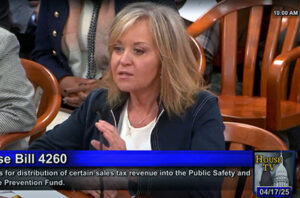MAC testifies for public safety fund bills; House committee advances them

MAC’s Deena Bosworth testified on public safety funding before a House committee on April 17, 2025.
Legislation to create a Public Safety Trust Fund advanced from the House Committee on Government Operations on Thursday after taking testimony from MAC and others in support of the concept.
House Bill 4260, by Rep. Mike Harris (R-Oakland), and HB 4261, by Rep. Alabas Farhat (D-Wayne), would dedicate $115 million annually from the state sales tax to a Public Safety and Violence Prevention Fund.
In a notable shift from previous versions, the updated legislation includes county sheriff’s departments as eligible recipients for funding.
“This is a significant improvement over prior iterations of this legislation,” said MAC’s Deena Bosworth during testimony. “Counties play a crucial role in providing public safety services, especially in communities without their own police departments, and this proposal finally recognizes that.”
Substitute bills were adopted at the beginning of the hearing that stripped a county board of commissioners’ flexibility to allocate these funds for things like prosecutors, specialty courts and mental health services, instead directing the funding to the county sheriff’s departments to use at their discretion. MAC expressed disappointment in the loss of flexibility but overall was supportive of the effort to create more resources for county public safety.
The legislation outlines a tiered distribution model:
- First $1.5 million: Directed to the Crime Victims’ Rights Fund
- Next $1.5 million: Allocated to the Department of Health and Human Services (DHHS) to create and administer a grant program for cities, villages, townships and counties for intervention solutions to community violence.
- Up to $72 million is earmarked for cities, villages, and townships that provide or contract for police services, and counties on behalf of townships and cities that do not. These funds will be distributed proportionally based on each jurisdiction’s average share of statewide reported violent crimes.
- $40 million to county sheriff’s departments, if they apply. Distribution will be made based on available funds and the size of the sheriff’s department.
The bills now move to the House floor.
For more information on this issue, contact Deena Bosworth at bosworth@micounties.org.
Bipartisan duo reintroduces Revenue Sharing Trust Fund bills to boost county funding stability
 In a renewed push to provide stable, predictable funding for Michigan’s county and local governments, Reps. Amos O’Neal (D-Saginaw) and Mark Tisdel (R-Oakland) have introduced two bills — House Bills 4311-12 — that would create a dedicated Revenue Sharing Trust Fund.
In a renewed push to provide stable, predictable funding for Michigan’s county and local governments, Reps. Amos O’Neal (D-Saginaw) and Mark Tisdel (R-Oakland) have introduced two bills — House Bills 4311-12 — that would create a dedicated Revenue Sharing Trust Fund.
The legislation carves out a portion of the state sales tax for direct deposit into the trust fund, with the goal of ensuring counties, cities, villages and townships receive payments consistent with the growth in the state sales tax, year after year.
Under the proposal, each county and each local unit would be guaranteed a minimum distribution equal to their fiscal year 2024 revenue sharing payment. Any additional funds deposited into the trust would be allocated using a formula adopted in the fiscal year 2025 budget, which considers the taxable value of counties relative to one another to equitably distribute remaining funds.
A version of this Revenue Sharing Trust Fund legislation passed the House in the last session with overwhelming bipartisan support. However, the Senate failed to take up the bills during the lame-duck period, despite urging from MAC, the Michigan Municipal League and the Michigan Townships Association.
With renewed attention this session, advocates are hopeful — but cautious.
“House support is not in question,” said Deena Bosworth, MAC’s director of governmental affairs. “The real question is whether the Senate will finally act. These bills aren’t flashy, but they’re foundational to local government health.”
If enacted, the bills would represent a long-awaited structural reform to how Michigan funds local government, offering more predictability and reducing the need for counties to wait on annual state budget negotiations to determine their funding levels.
MAC remains optimistic that this could be the year meaningful, bipartisan change takes hold for Michigan’s county governments.
For more information on this issue, contact Deena Bosworth at bosworth@micounties.org.
Road funding plan discussed in Senate Appropriations Committee
 The benefits ― and potential challenges ― of a Republican road funding plan were discussed at length this week before the Michigan Senate Appropriations Committee.
The benefits ― and potential challenges ― of a Republican road funding plan were discussed at length this week before the Michigan Senate Appropriations Committee.
The GOP package, which cleared the House a few weeks ago, proposes allocating more than $3 billion annually to road repairs by redirecting existing revenues. The plan is highly focused on money for local and county roads, offering an annual road funding increase of a minimum of 97 percent to each county road system. However, the proposal has faced criticism from various stakeholders regarding its potential impact on the state’s General Fund and local services.
Key Provisions of the plan (HB 4180 , HB 4181 , HB 4182 , HB 4183 , HB 4184 , HB 4185 , HB 4186 , HB 4187 and HB 4230):
- Corporate Income Tax Allocation: Redirecting about $2.2 billion in corporate income tax revenue that would have otherwise gone to the state’s general fund, dedicating it to road funding.
- Motor Fuel Tax Adjustment: Increasing the motor fuel tax by 20 cents per gallon, while eliminating the 6 percent sales tax on gasoline. The additional revenue generated would be earmarked for road maintenance and construction.
- Neighborhood Road Fund: Establishing a fund specifically for neglected side streets and roads that are not federally aid-eligible, ensuring that smaller local governments have access to necessary resources.
During the Senate hearing, the Citizens Research Council (CRC) presented its March 2025 report, “Assessment of Michigan’s Road Program,” which provides an in-depth analysis of the state’s road funding and allocation strategies. The CRC’s key findings and recommendations include:
- Overhaul of Road Funding Law (PA 51): The current road funding law is deemed ineffective and in need of replacement with a new funding formula that considers the role of each road and the relative cost of constructing and maintaining roads and bridges. A repeal and replacement of this law will be highly controversial and likely take years to accomplish.
- Indexing to Road Construction Cost Inflation: Any new road funding should be indexed to road construction cost inflation to ensure long-term sustainability.
- Independent Road User Cost Allocation Study: Conducting a comprehensive study to assess the costs imposed by various classes of trucks on the road network.
- Local-option Revenue Sources: Authorizing local governments to implement revenue sources for road funding that are not dependent on the property tax system, providing them with greater fiscal autonomy.
The Senate Fiscal Agency testified the GOP plan would create significant shortfalls in the General Fund. The redirection of corporate income tax revenue and the elimination of the gasoline sales tax would reduce general fund revenues by about $2.9 billion annually. This raises concerns about potential cuts to essential services and programs that rely on general fund allocations.
MAC has expressed support for the focus on local roads but cautioned against the potential harm to revenue sharing and the state’s General Fund. MAC continues to emphasize the need for a dedicated Revenue Sharing Trust Fund to protect local revenues from fluctuations in the state budget.
For more information on this issue, contact Deena Bosworth at bosworth@micounties.org.
Bill moves to ship $75M to aid Northern Michigan storm recovery

Example of the effects of an ice storm that struck Northern Michigan in March.
A $75 million aid package for areas in Northern Michigan devastated by a recent ice storm cleared the House Appropriations Committee unanimously this week.
House Bill 4328, by Rep. Parker Fairbairn (R-Emmet), proposes a supplemental appropriation of $75 million to aid recovery efforts. The total cost for the recovery is estimated at upwards of $200 million.
Before acting, the committee heard testimony from several House members from the region on the ice storm’s effects, particularly lingering power outages.
The legislation directs the Michigan State Police to administer disaster relief grants to local governments, helping them access and secure emergency assistance for residents, businesses, and communities suffering from storm-related financial hardship.
The $75 million would be distributed through a series of grants targeted at:
- Supporting emergency protective measures to safeguard life, property, and public health
- Providing labor assistance, including unemployment benefits and dislocated worker support
- Preventing utility shutoffs through energy assistance for affected residents
- Repairing or replacing damaged infrastructure
- Providing state matching funds required to secure federal disaster assistance
The bill now moves to the full House. Lawmakers on both sides of the aisle have expressed strong support. If approved by the Legislature and the governor, the funding could be available within weeks.
For more information on this issue, contact Deena Bosworth at bosworth@micounties.org.
House bills introduced to ban local sanctuary policies
 A package of bills aimed at banning “sanctuary” immigration policies at the local level were introduced in the House this week. The legislation would prevent cities, villages, townships and counties from adopting or enforcing any policies that limit cooperation with federal immigration authorities.
A package of bills aimed at banning “sanctuary” immigration policies at the local level were introduced in the House this week. The legislation would prevent cities, villages, townships and counties from adopting or enforcing any policies that limit cooperation with federal immigration authorities.
The key pieces of legislation — House Bills 4338 (Rep. Cameron Cavitt, R-Alpena), 4339 (Rep. Joseph Pavlov R- St. Clair) and 4342 (Rep. James DeSana, R- Macomb) — mandate compliance and impose penalties on noncompliant municipalities. Local governments would be required to eliminate any existing sanctuary-style policies within 60 days. If they don’t comply, they could face both legal and financial consequences.
Here’s a brief overview of what the legislation would do:
- Mandate statewide cooperation: Local governments across Michigan would be barred from enacting or enforcing any policy that limits communication or cooperation with federal immigration officials.
- Enforce compliance through lawsuits and penalties: Residents and the attorney general would be able to sue noncompliant localities, with courts empowered to issue injunctions, mandate policy changes and award damages and attorneys’ fees. HB 4342 adds a financial penalty by allowing the state to withhold critical revenue-sharing funds from municipalities that violate the law.
- Increase financial and legal exposure: Smaller municipalities with limited budgets may face lawsuits, significant legal costs, and funding losses, potentially affecting essential services like public safety and infrastructure.
Together, these bills aim to eliminate sanctuary policies in Michigan by compelling local cooperation with federal immigration enforcement and creating serious consequences for jurisdictions that choose not to comply.
This legislation has been referred to the House Government Operations Committee.
For more information on this issue, contact Jimmy Johnson at johnson@micounties.org.
Podcast squad recaps 2025 Legislative Conference, veteran grants situation

Kyle Melinn of MIRS News Service (right) moderates the Legislative Panel at the 2025 Legislative Conference on April 9, 2025.
MAC’s Podcast 83 team returns after the spring legislative break to catch up members on activities at the 2025 Legislative Conference and the continuing wrangle over veteran service grant funding.
“So, last week, we had our conference on Monday, Tuesday and Wednesday,” noted host Stephan Currie. “So, Deena (Bosworth) and Jimmy (Johnson), give me one of your highlights.”
“The legislative panel was great,” Bosworth said. “I thought (moderator Kyle Melinn of MIRS News Service) did a nice job there. We didn’t get a ton of answers from our legislators, but we did have a good discussion on road funding; on what they think they might be able to get done.
“That was quite a lively debate about whether they thought they were going to get the budget done. You know, there was one very optimistic member that said by June 1, and I don’t know if I’m buying that, but it was the dark cloud around a lot of the policy issues they talked about too, you know,” Bosworth added. “What does this budget really look like? And if we’re anticipating cuts from the federal government, how are we going to fund the roads? Is there really the money there for the House Republican road package? … A lot of debate and a lot of uncertainty on it.”
“This was my first conference,” said Johnson. “So it was just very interesting being able to meet a lot of our members … With each pod, we had lively discussion, and a lot of people had some really insightful follow-ups.”
Pivoting to the ongoing issue with funding for county veteran grants for fiscal 2026, Johnson explained, “So there’s a lot of issues that are taking place there. … Luckily, we have Rep. Julie Rogers. She’s an Appropriations member, and she had been talking about the need to fix this. She’s currently working with us and looking for different avenues to where we can backfill that funding.”
“And what’s, what would the dollar figure be?” Currie asked.
“It’s $3.6 million,” Johnson replied.
“OK, so that’s not a ton of money,” Currie said. “I mean, that should even be in a supplemental; it should be fairly easy to get done to keep counties whole. But like you said, we’ll stay tuned. And luckily, this is a bipartisan thing. You know people on both sides were hearing from members who are equally upset. So, I think that this is going to be one of those things that everybody can work together on.”
To view the full episode, recorded on April 14, click here.
Previous episodes can be seen at MAC’s YouTube Channel.
And you always can find details about Podcast 83 on the MAC website.
MAC offers virtual ‘office hours’ for opioid settlement issues
 As part of its ongoing efforts to assist counties with deploying opioid settlement dollars, MAC is beginning a weekly “office hour” via Microsoft Teams for questions and discussions.
As part of its ongoing efforts to assist counties with deploying opioid settlement dollars, MAC is beginning a weekly “office hour” via Microsoft Teams for questions and discussions.
The new service begins on April 29.
“Opioid Settlement Office Hours is a virtual platform for local governments to connect to support, resources and other local governments,” explained Amy Dolinky, MAC’s opioid settlement technical adviser. “These weekly sessions are intended to offer an informal opportunity to ask questions and gain insights on opioid settlement planning, spending, monitoring and transparency.”
Details, including the MS Teams link, can be found in this flier.
County health officials honored during Public Health Week
 Health officials in five Michigan counties were among recipients this year of awards issued annually during Michigan’s Public Health Week (April 6-12).
Health officials in five Michigan counties were among recipients this year of awards issued annually during Michigan’s Public Health Week (April 6-12).
Receiving the prestigious Jean Chabut Award were:
- The Barry-Eaton District Public Health Department
- The Oakland County Health Division
- Adeline Hambley, Ottawa County Department of Public Health
The Chabut Award honors “organizations and individuals (that) have demonstrated an untiring commitment to the health and safety of their communities.”
Receiving Hometown Heroes Awards were:
- The Ingham County Health Department Neighborhood Wellness Center at Epicenter of Worship
- St. Clair County Community Mental Health
Hometown awards honor “individuals and organizations (that) have gone above and beyond to improve the health and well-being of their communities through dedication, innovation and service.”
Honorees are selected by the Michigan Public Health Week Partnership, which includes MAC and the Michigan Association for Local Public Health, a MAC affiliate. For complete details on the honorees’ work, click here.
>div id=”staff”>
 Staff picks
Staff picks
- Data-driven assessment of Michigan’s road program (webinar) (Citizens Research Council of Michigan)
- What we know about veterans who work for the federal government (Pew Research)
- As some say ‘don’t gas geese,’ Michigan will forge ahead with new lethal roundup (MLive)
- 30,000 gallons of maple syrup likely lost in historic Michigan ice storm (Bridge Michigan)
